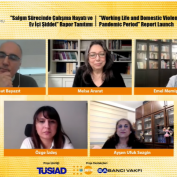THE “WORKING LIFE AND DOMESTIC VIOLENCE IN THE COVID-19 PERIOD” REPORT HAS BEEN ANNOUNCED.
62% OF WOMEN EMPLOYEES WERE EXPOSED TO VIOLENCE AT LEAST ONCE IN THE LAST 3 MONTHS.
Sabancı University Corporate Governance Forum; The “Working Life and Domestic Violence in the COVID-19 Period” report, which was prepared within the scope of the Business Against Domestic Violence project launched in 2014 with the support of TÜSİAD, United Nations Population Fund (UNFPA) and Sabancı Foundation, revealed that domestic violence experiences of female employees increased during the COVID-19.
According to the report, 62% of female employees have experienced some form of domestic violence at least once in the last 3 months. Psychological violence was the most common type of violence that female employees were exposed to with 58%. The rate of those who were subjected to social violence were 15%, physical violence was 12%, and sexual violence was 9%.
Sabancı University Governance Forum; has shared the “Working Life and Domestic Violence in the COVID-19 Period” report which was prepared within the scope of the “Business Against Domestic Violence – BADV” project, initiated in 2014 with the support of TÜSİAD and the United Nations Population Fund (UNFPA) and the Sabancı Foundation.
According to the report, 62% of female employees have been subjected to some type of violence at least once in the last 3 months by their partners or with whom they are at home with, while the type of violence that they were exposed to the most was psychological violence with 58%. This was followed by social violence with 15%, physical violence with 12% and sexual violence with 9%.
This study was designed by Sabancı University Corporate Governance Forum (SU CGF) as part of the Business Against Domestic Violence (BADV) Project. First implemented in 2013 by SU CGF with the support of the United Nations Population Fund (UNFPA) and the Sabancı Foundation in strategic partnership with the Turkish Industry and Business Association (TÜSİAD), the BADV Project aims to disseminate the best policies, practices, tools, and methods to mitigate domestic violence by establishing support mechanisms in workplaces against violence experienced by employees and using the managerial competencies and organizational resources of the business world. By the end of 2020, the number of companies involved in the project reached 73 and the number of employees covered by the project reached 183,215.
The study titled “Working Life and Domestic Violence in the Covid-19 Period”, which is the subject of this report, was designed to investigate the personal and professional impacts of violence inflicted by family members, including spouses, living in the same home as the relevant employees during the COVID-19 period. More specifically, the study aimed to find whether employees of companies that had developed policies that promote gender equality and/or protect against violence and employees of other companies were affected differently in the pandemic period.
At the opening of the meeting, evaluations of the report were shared by Hassan Mohtashami-UNFPA Turkey Representative, Nevgül Bilsel Safkan - General Manager of Sabancı Foundation, and Oya Ünlü Kızıl, Chair of the TÜSİAD Gender Equality Working Group.
Hassan Mohtashami, UNFPA Turkey Representative stated that during the COVID-19 global pandemic, women and girls have become more vulnerable to domestic violence coupled with economic and social stress deepened by limited access to sexual and reproductive health services. Mohtashami made the following assessment of the report:
“The Business Against Domestic Violence (BADV) project is a successful project that demonstrates that the private sector can be an active factor in preventing gender-based violence at work and establishing the necessary mechanisms to intervene such cases. As demonstrated in the report, companies under the BADV project have been able to offer more efficient and durable prevention and response mechanisms so that their employees can receive effective support during the pandemic. However, this report also shows that our work is not yet completed. To prioritize the voices, experiences and needs of women in the workplace, we must intensify our efforts to eradicate domestic violence and continue to increase the momentum that has been created. It’s time to act and say no to violence every day, not just one day.”
Nevgül Bilsel Safkan, General Manager of Sabancı Foundation underlined in her speech that the domestic and care work burden of women and the rates of violence in the home increased with the pandemic: “In order for companies to increase their effective roles in combating domestic violence; employees’ awareness of current policies need to be increased and managers need to be informed about the signs of violence. It is equally important to provide institutional support for women working from home to balance home-work life. To minimize the negative effects of the pandemic on women’s human rights, it is very important that we identify the needs with scientific research and shape our work in the light of these priorities. Companies that receive training and develop policies within the scope of the Business Against Domestic Violence project not only ensure the equality of their employees, but also contribute significantly to social justice. I invite the entire business world to develop and implement policies to combat domestic violence against women, and I hope this publication will guide them in this regard.”
Oya Ünlü Kızıl, Chair of the TÜSİAD Gender Equality Working Group stated that one of the most important contributions of the Business Against Domestic Violence project is that it regularly provides gender-disaggregated data on the effects of the pandemic. Oya Ünlü Kızıl expressed, “It is not possible for violence against women to end completely without gender equality.” And continued to emphasize the point in her speech: “In line with the rule you cannot manage what you cannot measure, it is imperative that the negativities faced by women be visible to be able to design effective interventions. In other words, it is especially important to regularly collect data and information disaggregated by gender on the effects of the pandemic. I think one of the most important contributions of the Business Against Domestic Violence project is that it regularly provides data in this area. In addition, it is particularly important that the strategies followed by companies and the activities they carry out for gender equality continue to get stronger. It is not possible for violence against women to end completely without gender equality. This hierarchy, this subordinate relationship created by the roles and expectations assigned to women and men by the society, causes women to be discriminated and/or exposed to violence in every field from family life to education, employment, and politics. The number of companies that are WEPs signatories, which are also involved in the Business Against Domestic Violence project or in ant way working in the field of gender equality should increase. We should all make an effort in this regard. It is always important to plan egalitarian and transformative interventions to prevent further deepening of gender inequalities, especially in times of crisis, and this can only be possible with the cooperation of the private sector, civil society and the public.”
At the meeting, a panel titled “The Impact of Working from Home on Women: Lessons from the COVID-19” was held, moderated by Melsa Ararat, Director of Sabancı University Corporate Governance Forum.
“Working Life and Domestic Violence in the COVID-19 Period” Report Outputs
It is observed that 76% of female participants and 53.5% of men devote more time to housework than before the pandemic.
The results of the survey indicate that in some households, if women work from home, men can assign some of the work they undertook before the pandemic to their spouses.
While 38.8% of all employees participating in the survey preferred to return to work at the workplace after the pandemic was over and social distance rules are lifted, 41,7% stated that they prefer to work from home for a few days of the week.
Post-pandemic work preferences of the participants living with their spouse or fiancée differ according to gender and the time they devote to housework. Although women generally prefer to work from home more than men, it is observed that these preferences decrease at the rate they take on housework.
When all participants were asked about the importance of the measures and support mechanisms taken by companies in the COVID-19 process, from all those who responded to this question, 87.8% cited measures for occupational health and safety as the most important followed by 84.3% citing paid sick leave, and 76.5% citing paid emergency care and leave.
The results show that 62% of female employees have been subjected to some type of violence at least once in the last 3 months.
The type of violence that most women were exposed to was psychological violence (58%9, as revealed by previous studies. This is followed by social violence (15%), physical violence (12%) and sexual violence (9%).
5% of the male participants stated that they committed violent behavior towards their spouses. When asked about the reasons for this behavior, economic problems an problems with children were cited as the leading causes in half of the cases.
While half of the women who are subjected to violence stated that they do not share this situation with anyone, it is noteworthy that no women share this situation with the workplace.
Female employees who work in BADV companies and are aware of the policy against violence are observed to experience less psychological distress than female employees working in other companies and declaring that there is no policy in their workplace.
Research Method:
The survey method was used in the study, and the survey was conducted online between 18 June 2020 and 31 August 2020. Links to the survey, which took about 10 minutes to complete, were shared with 73 companies involved in the BADV project between 2016-2020 and were forwarded to employees by company managers via e-mail. The survey was also shared via social media and delivered to employees of companies not involved in the BADV project. A total of 37 employers from BADV companies participated in the survey. 1.261 people participated in the survey.
Click here to access all the works carries out within the scope of BADV


